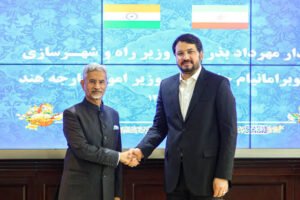On Monday, India and Iran sealed a pivotal 10-year contract aimed at fortifying the operational framework of the Chabahar port. This significant agreement, inked between Indian Ports Global Ltd. (IPGL) and the Port and Maritime Organisation (PMO) of Iran, underscores both nations’ commitment to fostering enhanced trade, maritime cooperation, and transshipment activities in the region.
After eight years of negotiations following the establishment of a general framework of cooperation on the Chabahar port, India and Iran have reached a milestone agreement. This long-term pact enables the operation of the Shahid-Beheshti terminal and signifies a renewed commitment to advancing bilateral ties in the maritime domain.
The 10-year contract, signed between IPGL and PMO, facilitates the operation of the Shahid-Beheshti terminal, marking a significant investment of approximately $120 million by IPGL to enhance port infrastructure. India extends a credit window amounting to $250 million for identified projects aimed at augmenting Chabahar-related infrastructure, underscoring India’s dedication to regional economic development. The signing ceremony, graced by Ports, Shipping, and Waterways Minister Sarbananda Sonowal and Mehrdad Bazrpash, Minister of Roads and Urban Development of Iran, signifies the culmination of years of negotiations and collaborative efforts between the two nations.
Strategic Significance of Chabahar for India
Mr. Sonowal hailed the agreement as a historic day for the maritime sector, emphasizing Chabahar’s pivotal role as a vital trade artery connecting India with Afghanistan and Central Asian countries. This strategic port holds immense potential to drive trilateral trade between India, Iran, and Afghanistan while fostering economic growth and cooperation in the region.
The conclusion of the long-term agreement comes after protracted negotiations, marked by complex issues such as arbitration disputes. Iranian Ambassador to India Iraj Elahi highlighted the significance of mutual trust and collaboration in resolving disputes, paving the way for the successful execution of the contract.
With India’s sustained investment in Chabahar port operations, its efficiency, capacity, and appeal are poised for further enhancement. The integration of Chabahar with a special free zone, coupled with India’s incentives on vessel-related and cargo charges, is expected to bolster trade flows and economic cooperation in the region.
Mr. Sonowal reiterated India’s commitment to utilizing Chabahar port for humanitarian aid shipments, showcasing India’s dedication to supporting regional development beyond commercial interests. The port has already facilitated the transshipment of essential commodities, including wheat, pulses, and environment-friendly pesticides, underscoring its role in fostering regional stability and resilience.
Master stroke for regional development
India has taken a significant step forward in bolstering its regional influence and trade connectivity by signing a pivotal 10-year agreement with Iran for the operation of the Chabahar port. This strategic move highlights India’s commitment to expanding its footprint in the region and tapping into the economic potential offered by Chabahar.
Eight years after laying the groundwork for cooperation on the Chabahar port, India and Iran have finally inked a 10-year contract, marking a significant milestone in their bilateral relations. The long-term agreement, signed between Indian Ports Global Ltd. (IPGL) and Port and Maritime Organisation (PMO) of Iran, paves the way for the operation of the Shahid-Beheshti terminal and entails an investment of approximately $120 million by IPGL.
Key Highlights of the Agreement:
– IPGL to invest $120 million in equipping the Shahid Beheshti terminal.
– India extends a credit window worth $250 million for infrastructure development projects related to Chabahar.
– Valid for 10 years, with provisions for extension.
– Dispute resolution mechanisms conducted under the UN Commission on International Trade Law (UNCITRAL) rules.
– Chabahar’s pivotal role in enhancing connectivity between India, Iran, Afghanistan, and Central Asian countries was emphasized.

Chabahar’s Significance
The signing of this historic agreement underscores Chabahar’s economic significance as a strategic trade gateway. India’s sustained engagement in Chabahar aims to enhance port efficiency, capacity, and resilience, thereby fostering economic growth and cooperation across the region.
With Chabahar serving as a vital trade artery, India aims to strengthen regional connectivity and facilitate smoother trade flows. The establishment of regular ship calls between Chabahar port and Indian ports has instilled stability and confidence among traders, offering them visibility and predictability in their supply chain operations.
Situated in the Sistan-Baluchistan province of Iran, Chabahar port holds immense strategic importance, providing easy access to large cargo ships and offering an alternative route that bypasses the sensitive Persian Gulf and Strait of Hormuz. India’s investments in Chabahar aim to bolster its strategic position in the region and promote trade through the International North-South Transport Corridor (INSTC).

Sarbananda Sonowal, Indian Ports and Shipping Minister said that Today is a historic day for the maritime sector of the region as India and Iran signed this long-term agreement on Chabahar Port, heralding a new age of trade and marine cooperation as well as transshipment.
Mehrdad Bazrpash, Iranian Minister of Roads and Urban Development also asserted, “The signature of this contract will have a multiplier effect on the viability and visibility of Chabahar port. Chabahar is not only the closest Iranian port to India, but it is also an excellent port from [a] nautical point of view.”
The long-term agreement for Chabahar port operations signifies a significant milestone in India’s efforts to enhance connectivity and trade links with Iran and beyond. As the port’s capacity and efficiency are further enhanced, it is poised to emerge as a key hub for regional trade and economic development.











